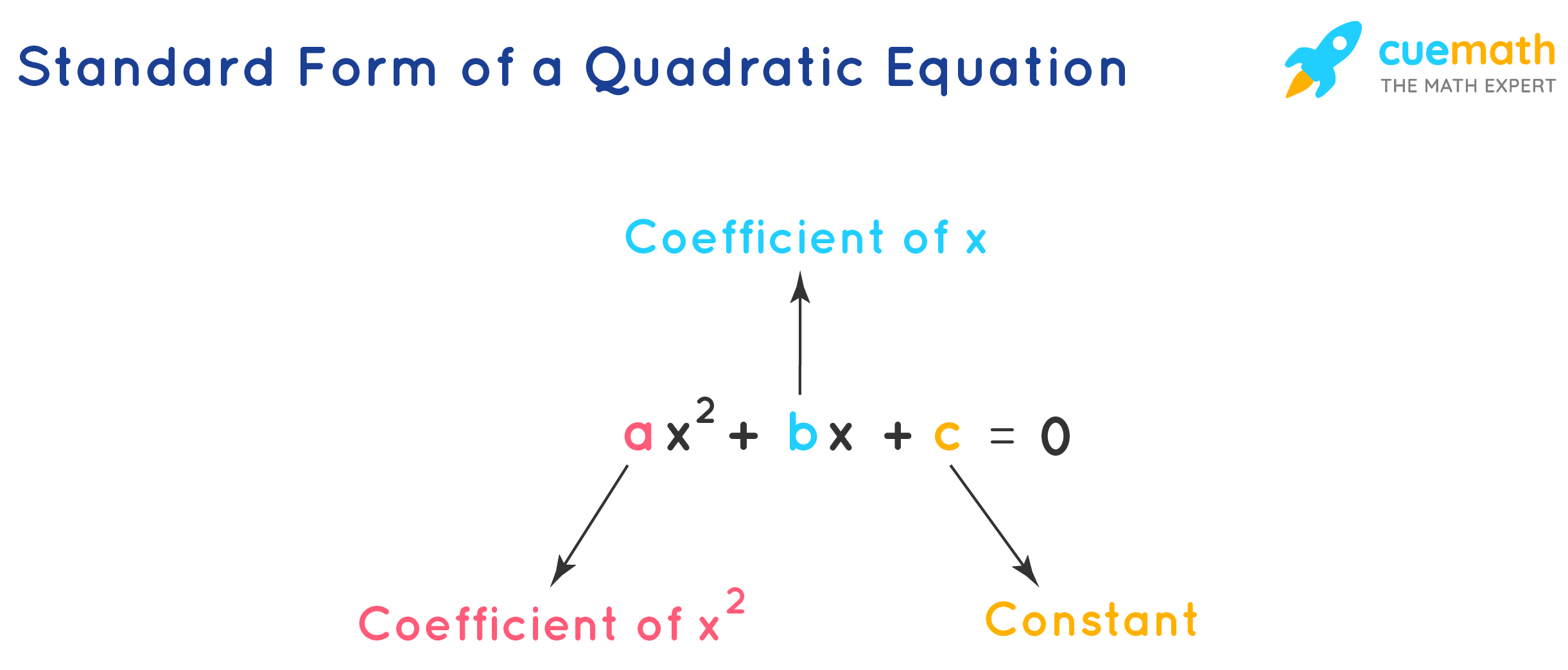Standard Form of Quadratic Equation
The standard form of quadratic equation is ax2 + bx + c = 0, where 'a' is the leading coefficient and it is a non-zero real number. This equation is called 'quadratic' as its degree is 2 because 'quad' means 'square'. Apart from the standard form of quadratic equation, a quadratic equation can be written in other forms.
- Vertex Form: a (x - h)2 + k = 0
- Intercept Form: a (x - p)(x - q) = 0
Let us learn more about the standard form of a quadratic equation and let us see how to convert one form of a quadratic equation into another.
What is the Standard Form of Quadratic Equation?
The standard form of quadratic equation with a variable x is of the form ax2 + bx + c = 0, where a ≠ 0, and a, b, and c are real numbers. Here, b and c can be either zeros or non-zero numbers and
- 'a' is the coefficient of x2
- 'b' is the coefficient of x
- 'c' is the constant

Examples of Standard Form of Quadratic Equation
Here are some examples of quadratic equations in standard form.
- 2x2 - 7x + 8 = 0
- (-1/3) x2 + 2x - 1 = 0
- √2 x2 - 8 = 0
- -3x2 + 8x = 0
General Form of Quadratic Equation
The standard form of a quadratic equation is also known as its general form. Thus, the general form of a quadratic equation is also of the form ax2 + bx + c = 0, where a ≠ 0.
Converting Standard Form of Quadratic Equation into Vertex Form
Let us convert the standard form of a quadratic equation ax2 + bx + c = 0 into the vertex form a (x - h)2 + k = 0 (where (h, k) is the vertex of the quadratic function f(x) = a (x - h)2 + k). Note that the value of 'a' is the same in both equations. Let us just set them equal to know the relation between the variables.
ax2 + bx + c = a (x - h)2 + k
ax2 + bx + c = a (x2 - 2xh + h2) + k
ax2 + bx + c = ax2 - 2ah x + (ah2 + k)
Comparing the coefficients of x on both sides,
b = -2ah ⇒ h = -b/2a ... (1)
Comparing the constants on both sides,
c = ah2 + k
c = a (-b/2a)2 + k (From (1))
c = b2/(4a) + k
k = c - (b2/4a)
k = (4ac - b2) / (4a)
Thus, we can use the formulas h = -b/2a and k = (4ac - b2) / (4a) to convert the standard to vertex form.
Example of Converting Standard Form to Vertex Form
Consider the quadratic equation 2x2 - 4x + 3 = 0. Comparing this with ax2 + bx + c = 0, we get a = 2, b = -4, and c = 3. To convert it into the vertex form, let us find the values of h and k.
- h = -b/2a = -(-4) / (2 · 2) = 1
- k = (4ac - b2) / (4a) = (4 · 2 · 3 - (-4)2) / (4 · 2) = (24 - 16) / 8 = 1
Substituting a = 2, h = 1, and k = 1 in the vertex form a (x - h)2 + k = 0, we get:
2 (x - 1)2 + 1 = 0
Converting Vertex Form to Standard Form
The process of converting the vertex form of a quadratic equation into the standard form is pretty simple and it is done by simply evaluating (x - h)2 = (x - h) (x - h) and simplifying. Let us consider the above example 2 (x - 1)2 + 1 = 0 and let us convert it back into standard form.
2 (x - 1)2 + 1 = 0 -------> Vertex Form
2 (x - 1) (x - 1) + 1 = 0
2 (x2 - x - x + 1) + 1 = 0
2 (x2 - 2x + 1) + 1 = 0
2x2 - 4x + 2 + 1 = 0
2x2 - 4x + 3 = 0 --------> Standard Form
Converting Standard Form of Quadratic Equation into Intercept Form
Let us convert the standard form of a quadratic equation ax2 + bx + c = 0 into the vertex form a (x - p)(x - q) = 0. Here, (p, 0) and (q, 0) are the x-intercepts of the quadratic function f(x) = ax2 + bx + c) and hence p and q are the roots of the quadratic equation. Thus, we just use any one of the solving quadratic equation techniques to find p and q.
Example to Convert Standard to Intercept Form
Consider the quadratic equation in standard form 2x2 - 7x + 5 = 0. By comparing this with ax2 + bx + c = 0, we get a = 2. Now we will solve the quadratic equation by factorization.
2x2 - 7x + 5 = 0
2x2 - 2x - 5x + 5 = 0
2x (x - 1) - 5 (x - 1) = 0
(x - 1) (2x - 5) = 0
x - 1 = 0; 2x - 5 =0
x = 1; x = 5/2
Thus, p = 1 and q = 5/2
Thus, the intercept form is,
a (x - p)(x - q) = 0
2 (x - 1) (x - 5/2) = 0
2 (x - 1) (2x - 5)/2 = 0
(x - 1) (2x - 5) = 0
Converting Intercept Form to Standard Form
The process of converting the intercept form of a quadratic equation into standard form is really easy and it is done by simply multiplying the binomials (x - p) (x - q) and simplifying. Let us consider the above example (x - 1) (2x - 5) = 0 and let us convert it back into standard form.
(x - 1) (2x - 5) = 0 -------> Intercept Form
2x2 - 5x - 2x + 5 = 0
2x2 - 7x + 5 = 0 --------> Standard Form
Important Notes on Standard Form of Quadratic Equation:
- A quadratic equation in standard form is ax2 + bx + c = 0.
- A quadratic equation in vertex form is a (x - h)2 + k = 0, where h = -b/2a and k = (4ac - b2) / (4a).
- A quadratic equation in intercept form is a (x - p)(x - q) + k = 0, where p and q are the roots of the quadratic equation.
☛Related Topics:
- Quadratic Expressions
- Multiplying Binomials Calculator
- Quadratic Equation Calculator
- Roots of Quadratic Equation Calculator
Cuemath is one of the world's leading math learning platforms that offers LIVE 1-to-1 online math classes for grades K-12. Our mission is to transform the way children learn math, to help them excel in school and competitive exams. Our expert tutors conduct 2 or more live classes per week, at a pace that matches the child's learning needs.
Examples of Quadratic Equations in Standard Form
-
Example 1: Which of the following quadratic equations are in the standard form?
a) 2x2 - 3x - 5 = 0
b) 0x2 - 3x + 5 = 0Solution:
We know that the standard form of a quadratic equation is ax2 + bx + c = 0, where 'a' is not equal to 0. Thus, in the given equations, only (a) is in the standard form
☛Note: Part b) has a = 0 and hence it becomes -3x + 5 = 0, which is a linear equation.
Answer: a) 2x2 - 3x - 5= 0 is in the standard form.
-
Example 2: Write the standard form of quadratic equation for the given expression: (x - 7) ( x - 8) = 0
Solution:
Let us convert the given equation into the standard form of quadratic equation (ax2 + bx + c = 0)
(x - 7) ( x - 8) = 0
x2 - 7x - 8x + 56 = 0
x2 - 15x + 56 = 0Answer: The standard form of the given quadratic equation is x2 - 15x + 56 = 0.
-
Example 3: Convert the following quadratic equation from standard to vertex form: 3x2 - 18x + 1 = 0.
Solution:
Comparing the given equation with the standard form of quadratic equation ax2 + bx + c = 0, we get a = 3, b = -18, and c = 1. Now we will find h and k.
- h = -b/2a = -(-18) / (2 · 3) = 3
- k = (4ac - b2) / (4a) = (4 · 3 · 1 - (-18)2) / (4 · 3) = (12 - 324) / 12 = -26
Substituting all these values in the vertex form a(x - h)2 + k = 0, we get:
3 (x - 3)2 - 26 = 0
Answer: The given quadratic equation in vertex form is 3 (x - 3)2 - 26 = 0.

FAQs on Standard Form of Quadratic Equation
What is Quadratic Standard Form?
The standard form of a quadratic equation with variable x is expressed as ax2 + bx + c = 0, where a, b, and c are constants such that 'a' is a non-zero number but the values of 'b' and 'c' can be zeros.
Can 'c ' be a Zero in the Standard Form of Quadratic Equation?
In the standard form of quadratic equation ax2 + bx + c = 0, only 'a' has a restriction that it should not be a zero. So the value of 'c' can be 0. Note, that the value of 'b' can also be a zero.
What is an Example of Quadratic Equation in Standard Form?
Some examples of quadratic equations in standard form are:
- √3x2 - 7x + 2 = 0
- x2 - 4x + (1/2) = 0
- 0.5x2 - 18 = 0
- x2 + x = 0
What is the Standard Form of Quadratic Function?
A quadratic function is a function that involves quadratic expression. i.e., its equation in standard form is f(x) = ax2 + bx + c, where a ≠ 0.
How to Convert a Quadratic Equation From Standard to Vertex Form?
The standard form of a quadratic equation is ax2 + bx + c = 0. To convert it into the vertex form a(x - h)2 + k = 0,
- The value of 'a' is obtained from the standard form.
- h = -b/2a
- k = (4ac - b2) / (4a)
Can 'a' be a Zero in Standard Form of Quadratic Equation?
The standard form of quadratic equation is ax2 + bx + c = 0. If a = 0, then the equation becomes bx + c = 0 which is not quadratic anymore (this is actually linear). Thus, the value of 'a' should NOT be a zero in a quadratic equation.
What is the Difference Between the General Form of Quadratic Equation and the Standard Form of Quadratic Equation?
The standard form of a quadratic equation is as same as its general form and is expressed as ax2 + bx + c = 0 where 'a' is non-zero.
Can 'b' be a Zero in the Standard Form of a Quadratic Equation?
In the quadratic equation ax2 + bx + c = 0, only 'a' (the coefficient of x2) shouldn't be a zero. So the value of 'b' can be 0.
visual curriculum
